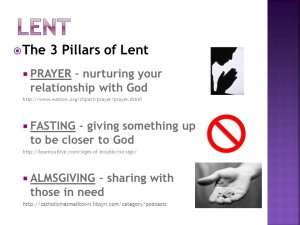A few weeks ago a friend came to my office prior to our prayer time. We were preparing to pray, and the subject of Lent came up. She was trying to figure out what she should give up and shared her friend’s quip: “Lent is not supposed to be a diet plan.” We laughed because of the half-truth hiding in her statement. We all know people who use Lent as an opportunity to lose a little bit of weight. As I reflected on our exchange, I realized that Christians practice Lent for different reasons. I decided that we could all benefit by re-examining the purpose of Lent so that we can enjoy a richer experience with our Lord during the Lenten season.
What is Lent?
LENT (stemming from an Anglo-Saxon word for “spring” and related to the English word “lengthen”) refers to the penitential period preceding Easter. Early Christians felt that the magnitude of Easter called for special preparation. As early as the second century, many Christians observed several days of fasting as part of that preparation. Over the next few centuries, perhaps in remembrance of Jesus’s fasting for forty days in the wilderness (Matt. 4:1–2), forty days became the accepted length of the Lenten season. Since the earliest years of Christianity, it had been considered inappropriate to fast on the day of the resurrection, so Sundays were not counted in the forty days. Thus, the Wednesday forty-six days before Easter came to be regarded as the beginning of Lent.¹
This year, Lent started on February 10th and will end on March 26th. Ash Wednesday begins Lent and represents mourning, repentance, and God’s judgment. In the Catholic churches, the priest rubs ashes in the form of a cross on worshipers’ foreheads.
What is the Real Meaning of Lent?
During Lent Christians remember their sinfulness, they repent, and they recognize afresh the forgiveness that comes from God in Jesus Christ alone. We recognize that God’s forgiveness for all has come at an infinite price—the death of Christ on our behalf.
Who Observes Lent?
I can think of at least three ways Christians observe Lent. Christians like me were not taught to observe all forty days of Lent, nor were we taught to give up something. Instead, we placed emphasis on Holy Week, and our church offered services throughout the week leading up to Easter. We attended luncheons and heard speakers give devotionals to help us reflect on Christ’s redemptive work on the cross. We attended Good Friday services to reflect on Christ’s crucifixion when He took our place on the cross. By Sunday, three days after the crucifixion, we celebrated the resurrection of Jesus!
Some Christians understand that Lent is a time to “give up something.” The Bible gives the example of fasting. When the Israelites honored the Day of Atonement, they fasted for the humbling of their soul (Lev 23:26-32). In modern Judaism, they practice two major fasts (The Day of Atonement and Tisha B’Av) and five minor fasts. They fast to “afflict the soul” or to “chasten the soul” (Ps 69:10).
Few people fast anymore. Instead of giving up food, they give up vices like smoking, drinking, or gossiping. Others focus on giving up Facebook, watching TV, or their mobile devices. They take part in Lent with their best understanding of what it represents.
One group of Christians really understands the meaning of Lent. They use the forty days leading up to Easter as an opportunity to sacrifice something that helps them draw closer to Christ. The few Christians I know who take Lent seriously grew up in the Catholic Church. Whatever they give up, they spend time in prayer every time they make the sacrifice. For example, if they are fasting, each time they miss a meal, they enter into a time of prayer. They thank God for His grace and mercy toward them. They remember how Christ sacrificed His life for them. They reflect on their need for salvation and the forgiveness of their sins. They thank God for the privilege of having an eternal love relationship with Him.
Regardless of which group we’re in, all Christians share one thing in common. We want to come before the Lord with the right motivation. We desire to prepare our hearts to celebrate Easter and all that Jesus has done for us. We want to come before God’s throne with a grateful heart. Whether we’re giving something up or not, let’s contemplate the sacrifice Christ made on our behalf. When Easter arrives, let’s celebrate Christ’s resurrection!
How are you observing Lent? What could you do to deepen your experience of Lent this year? How would that enhance your Easter celebration?
I look forward to hearing your thoughts below.
Blessings,
Lee Ann
¹ Grissom, F. A. (2003). Lent. In C. Brand, C. Draper, A. England, S. Bond, E. R. Clendenen, & T. C. Butler (Eds.), Holman Illustrated Bible Dictionary (p. 1025). Nashville, TN: Holman Bible Publishers.






I love the lesson about lent. As an ex-Catholic I was taught to give something up but never knew the true meaning. It was always, as you said, chocolate or TV something you liked but not necessarily a true sacrifice. I love the idea that it should be substituted with prayer and building the love relationship with God. I will share this post as I do with many of your posts to bring a true understanding. Thank you for your love in building the kingdom.
Ro
Thanks, Ro! I appreciate your affirmation of my writing ministry.
Love you friend,
Lee Ann